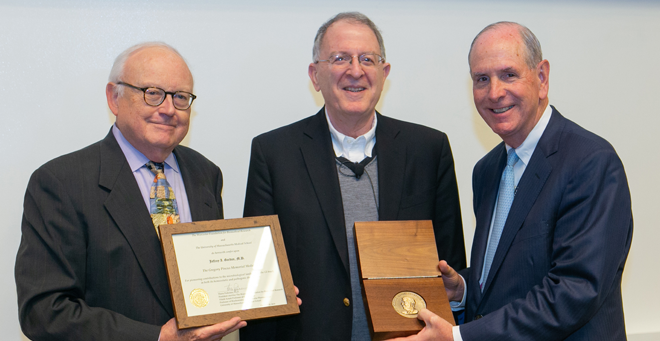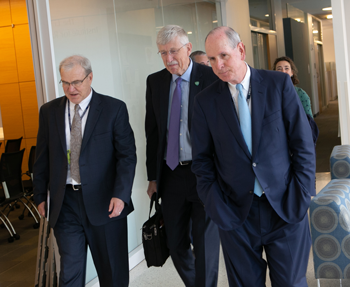
|
Jeffrey I. Gordon, MD, the Dr. Robert J. Glaser Distinguished University Professor and director of the Edison Family Center for Genome Sciences and Systems Biology at the Washington University School of Medicine, was awarded the Gregory Pincus Medal at UMass Medical School on Oct. 29. Dr. Gordon delivered the Pincus Memorial Lecture Development of microbiota-directed complementary foods for treatment of childhood malnutrition.
“He and his group have moved their work on the human gut microbiome into the most global and socially conscious dimensions with particular reference to childhood malnutrition in underdeveloped countries,” said Thoru Pederson, PhD, the Vitold Arnett Professor of Cell Biology, professor of biochemistry & molecular pharmacology, associate vice provost for research and president emeritus of the Worcester Foundation for Biomedical Research.
Dr. Pederson hosts the annual Pincus Memorial Lecture, established in 1969 to honor Gregory Pincus, a pioneer in reproductive biology and the co-founder of the Worcester Foundation for Biomedical Research. Seven of the recipients of the Pincus Medal were or subsequently became Nobel laureates.
In his talk, Gordon traced his lab’s work focused on addressing the global health challenges of obesity and childhood undernutrition through new understanding of the interactions between diets and the gut microbiome. He discussed new ways of promoting healthy development of the gut community during the first several years of postnatal life.

NIH Director Francis Collins, PhD, (center) attends the Pincus Memorial Lecture |
Gordon is internationally renowned for pioneering research into how gut microbial communities affect human development. He and his team have shown that nurturing a healthy microbiome with what National Institutes of Health Director Francis Collins, PhD, in his blog called microbiota-directed complementary food, can promote normal development in malnourished young children.
Dr. Collins was among the distinguished scientists attending the event during a visit to UMMS while he was in Worcester to deliver the keynote address for the 34th Annual Meeting of the Research Bureau. Sworn in as NIH director in 2009, Collins oversees the work of the largest supporter of biomedical research in the world, spanning the spectrum from basic to clinical research.
UMMS faculty and students welcomed the opportunity to interact with Gordon and Collins during a faculty luncheon and a student roundtable discussion with U.S. Rep. James McGovern.
Related stories on UMassMedNow:
In Pincus Lecture, Patricia Donahoe details pioneering work in reproductive endocrinology
Pierre Chambon awarded Gregory Pincus Medal by UMMS